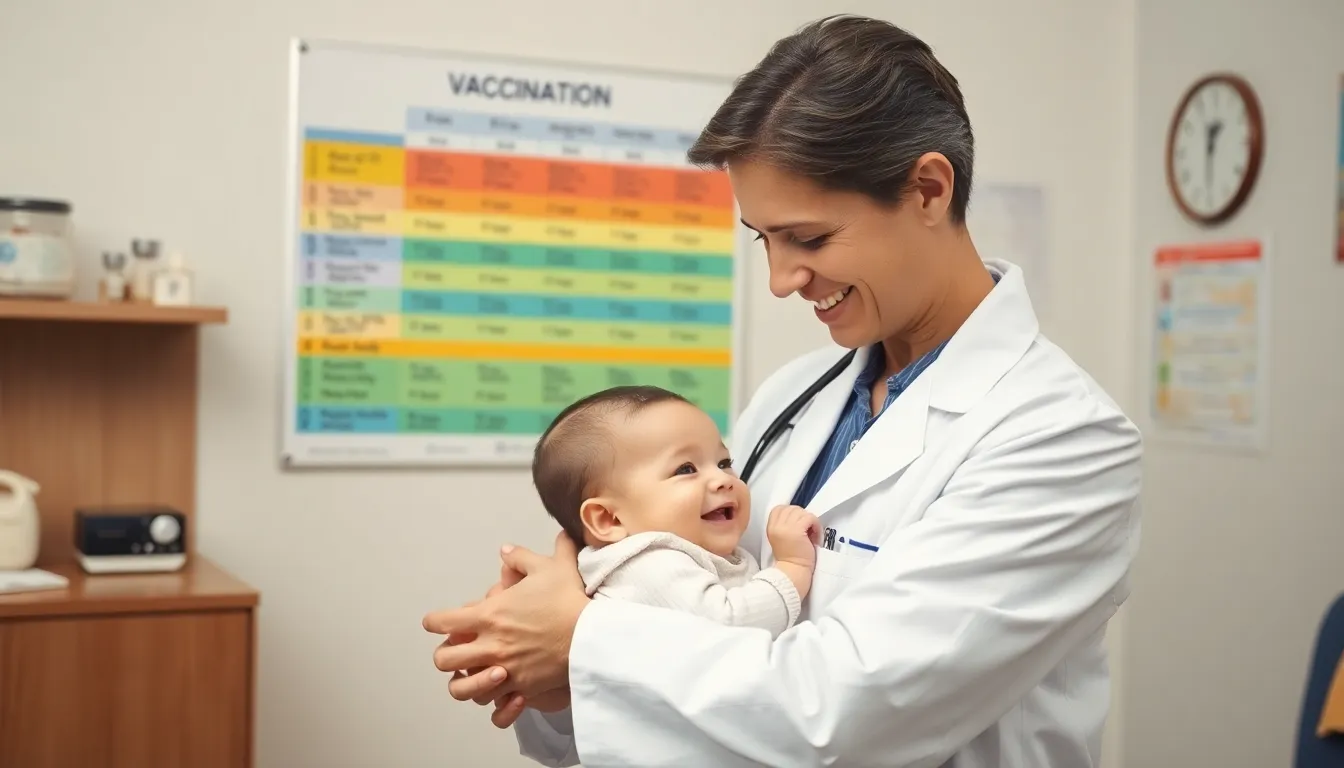When it comes to keeping little ones healthy, vaccinations are the superhero sidekicks every parent needs. They swoop in to protect infants from serious diseases that can turn tiny giggles into big worries. But with so many shots on the schedule, it can feel like a game of dodgeball—one wrong move and you might miss a crucial dose.
Navigating the vaccination routine doesn’t have to be a daunting task. With a bit of knowledge and a sprinkle of humor, parents can turn this health journey into a fun adventure. After all, who wouldn’t want to arm their baby with the ultimate defense against pesky germs? Let’s dive into the essentials of infant vaccinations, ensuring those little heroes are ready to take on the world, one adorable smile at a time.
Table of Contents
ToggleImportance of Vaccination for Infants
Vaccination plays a crucial role in an infant’s health, serving as a defense mechanism against infectious diseases. The first vaccines typically introduce an infant’s immune system to weakened or inactive parts of pathogens. This exposure prompts the body to build immunity, preventing potential illnesses.
Vaccines are instrumental in reducing the prevalence of serious diseases like measles, whooping cough, and polio. Without timely vaccinations, infants remain highly vulnerable to these dangerous infections, which may lead to severe complications or hospitalization. For example, according to the Centers for Disease Control and Prevention (CDC), vaccinations have led to a 90% decrease in measles cases since the vaccine’s introduction.
Parents often feel overwhelmed by the vaccination schedule, which can include multiple doses in the first year. Understanding that these vaccines are spaced to maximize immunity can alleviate some stress. A manageable routine allows parents to stick to the recommended timetable, thus ensuring that their child is adequately protected.
Protection extends beyond the individual infant; vaccinations contribute to herd immunity. When a significant portion of the community is vaccinated, it decreases disease transmission, safeguarding those who cannot be vaccinated due to medical reasons. Statistics show that increased vaccination rates lead to a decrease in outbreaks, enhancing public health.
Embracing the vaccination journey as an essential step fosters confidence in parents and caregivers. With a positive approach, they can celebrate each vaccination visit, knowing they are actively contributing to their child’s long-term health and well-being.
Recommended Vaccination Schedule

Vaccinations for infants occur at critical stages, providing essential protection against various diseases. Following the recommended schedule ensures effective immunity development.
Birth to 6 Months
At birth, infants typically receive the hepatitis B vaccine. A series of vaccines follows, including the DTaP (diphtheria, tetanus, and pertussis), Hib (Haemophilus influenzae type b), IPV (inactivated poliovirus), and PCV13 (pneumococcal conjugate vaccine). Between 2 to 6 months, additional doses occur to strengthen the immune response. The first dose of the rotavirus vaccine often gets administered during this timeframe, protecting against severe intestinal infection. Each vaccination plays a pivotal role in building a robust defense against serious illnesses.
6 to 12 Months
Vaccination during this period includes the flu vaccine, typically recommended for all infants starting at 6 months. The MMR (measles, mumps, and rubella) vaccine usually becomes available between 12 to 15 months for those who meet eligibility. Continued doses of PCV13 and Hib reinforce immunity against pneumococcal diseases. Regular checks with a pediatrician help track these vaccinations, ensuring timely protection. Staying current with the vaccination schedule is crucial for maintaining sufficient immunity levels as the infant grows.
Common Vaccines and Their Benefits
Vaccinating infants involves several key vaccines, each providing essential protection against harmful diseases.
DTaP Vaccine
DTaP stands for diphtheria, tetanus, and pertussis. At 2 months, babies start their DTaP series, with additional doses at 4 and 6 months. This vaccine protects against diphtheria, a serious throat infection; tetanus, a disease causing painful muscle contractions; and whooping cough, which leads to severe coughing fits. Protection from these diseases can prevent long-term health complications. The CDC reports that DTaP has significantly lowered the incidence of these infections, reducing whooping cough cases in communities. Overall, DTaP vaccination contributes to safer environments for infants and protects vulnerable populations.
MMR Vaccine
The MMR vaccine protects against measles, mumps, and rubella. Infants typically receive this vaccine between 12 and 15 months. Measles can cause serious health complications, including pneumonia and encephalitis, while mumps may lead to meningitis and swelling of the testicles. Rubella poses risks, especially during pregnancy, potentially leading to birth defects. Vaccinating against these diseases significantly decreases their prevalence. Notably, measles cases have decreased by over 90% since the MMR vaccine’s introduction, underscoring its effectiveness. The MMR vaccination not only guards individual health but also supports public health by contributing to herd immunity.
Addressing Common Concerns
Concerns about vaccinations often arise among parents. It’s crucial to clarify these apprehensions with factual information.
Vaccine Safety Myths
Myths surrounding vaccine safety often lead to confusion. Many believe vaccines cause autism, yet extensive research shows no connection. Studies conducted by the Institute of Medicine and the CDC consistently affirm vaccine safety. Another common misconception is that vaccines contain harmful ingredients. In reality, vaccines undergo rigorous testing and monitoring before approval. Regulatory agencies ensure that ingredients are safe in the quantities used. Understanding these facts can ease fears and encourage trust in the vaccination process.
Side Effects to Expect
Side effects vary from mild to moderate among infants after vaccinations. Common reactions include a low-grade fever and localized swelling at the injection site. These symptoms typically resolve within a few days. Serious side effects are rare, with the CDC estimating incidences at below 1 in a million doses. Parents should monitor their babies for unusual reactions and consult healthcare providers if concerns arise. Knowledge of expected side effects helps parents feel prepared and reassured after each vaccination visit.
Vaccination is an essential part of an infant’s journey toward a healthy life. By staying informed and embracing the vaccination schedule, parents can protect their children from serious diseases while contributing to community health. Each visit to the pediatrician is a step forward in building a strong immune system and fostering a sense of security.
Celebrating these milestones transforms what may seem daunting into a positive experience. With the right mindset and resources, parents can navigate this critical aspect of childcare confidently. Ultimately, vaccinations empower families to safeguard their little ones against potential health threats, ensuring a brighter future for all.



